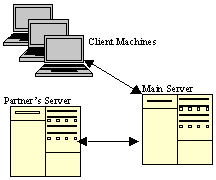We offer consulting services that help automate business processes. This includes
- XML-enabled websites
- Web Services using WSDL, SOAP and UDDI
- E-commerce websites in Microsoft™ or Java™ technologies
- Client-server applications
- Intranet applications
- Database application development

 XML adds flexibility for developing content-driven websites. The separation between content
and presentation adds a new level of abstraction, allowing content-creators for developing content
like news-feeds, press-releases, etc., while site-designers can focus on the presentation aspects.
XML adds flexibility for developing content-driven websites. The separation between content
and presentation adds a new level of abstraction, allowing content-creators for developing content
like news-feeds, press-releases, etc., while site-designers can focus on the presentation aspects.
The content can be stored either in XML Documents, in XML databases, Relational databases,
or any other types of format. Many data transformation tools are available which can extract
data from a variety of sources.
This website is also XML enabled. The Whitepapers and
Press Releases sections are driven by XML content presented
by XSL Stylesheets. Because the XSLT (XSL Transformation) rules are applied on the server-side,
creating HTML output, even non-XML capable browsers can view the content.
Sophisticated logic can be implemented using XSL Tranformation rules, allowing content to be sorted,
filtered and presented as per needs of the client. Many tools are available on both Microsoft™ and Java™
platforms for efficiently handling XML data.
Information on how we XML-enabled our website can be found in the
Whitepapers section.

 Integrating a company's operations with its Business Partners makes a tightly connected business system.
Communication flows smoothly and decisions can be made quickly. Web Services help achieve this goal in
a standards based manner. They expose an API (Application Programming Interface) to the business partners
via the Web, helping them to build systems that consume a company's in-house data.
Integrating a company's operations with its Business Partners makes a tightly connected business system.
Communication flows smoothly and decisions can be made quickly. Web Services help achieve this goal in
a standards based manner. They expose an API (Application Programming Interface) to the business partners
via the Web, helping them to build systems that consume a company's in-house data.
For example, a company selling cars through a network of dealers can allow a dealer's system to place
orders, check inventory, etc. by implementing a wrapper around their existing system which talks to
the Web Service API published by the parent company. Each dealer might have a different in-house system,
but all of them can talk in a uniform way to the parent company's system through the Web Service API.
Another famous example is of Fedex which published a Web Service API for allowing clients to calculate the
cost of shipping a package.
There are thousands of Web Services already in use, and there are many directories who maintain an index
of such services. Publishing a company's Web Service API is therefore easy, and allows many others to
build applications around such APIs.
Soorya Software is currently in the process of building a Web Service which will allow its clients to
monitor the status of their Projects, and each task in the project. When completed, the API will allow
a Windows™ or Java™ program to talk to the API. The advantage is that such client programs can store the
information in their local databases, and do not have to be connected to the network all the time. They
also allow a much richer User Interface (UI) than can be built in a web page.

E-commerce websites provide a way to conduct business online. We have several Enterprise-ready modules
that can be used to build such websites, and can be customized to suit a company's needs. While these
modules are built in Java™ for cross-platform capability, they can also be implemented in Microsoft™
technologies like Active Server Pages (ASP) or Visual Basic™ server-side ActiveX components.
Take a look at our comprehensive solutions in our E-Commerce Section.

When web-based applications cannot provide the rich User Interface (UI) needed in complex client-based
applications, Visual Basic™ and Java™ technologies can be used to build client/server applications. We
have extensive knowledge in both these platforms, and can build custom solutions for a company's needs.

Where a company is automating its business processes for internal users, Intranet Applications serve
the best vehicle for deploying solutions quickly. This is because the user's environment can be
controlled by system administrators, like which web-browser should be installed on a user's machine.
Microsoft's Internet Explorer™ browser is a powerful tool which can provide a compromise between
providing a rich User Interface and allowing single-step web-deployment of the application. This has
significant benefits in reducing deployment costs, as well as providing flexibility in implementing
server-side functionality using any technology like Active Server Pages (ASP), Java Server Pages (JSP),
Enterprise Java Beans (EJB) on any platform (Windows™, Linux, Solaris™, etc.).

We have extensive experience in implementing solutions on a variety of platforms and databases. On
Windows™ platform we can build applications using Microsoft Access, Microsoft SQL Server, or
Oracle. On Linux, Solaris or other platforms we primarily offer services for Oracle databases.
|